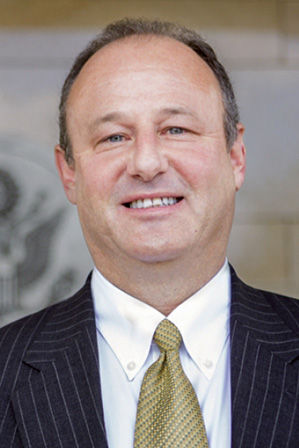A Message from George Shultz to the Foreign Service
President’s Views
BY ERIC RUBIN

We are honored to share in this month’s FSJ a superb essay by former Secretary of State George Shultz on the occasion of his 100th birthday. In it, he asks that we take another look at training and education in the Foreign Service as a requirement for the kind of strategic thinking needed going forward.
He notes that the U.K. has established a diplomatic academy and urges that we consider much greater training and preparation for members of the Service, both at the beginning of their careers and at various stages along the way.
Secretary Shultz asks that we stop stigmatizing education and training as “non-promotable” endeavors and instead treat them as essential experiences for promotion, as the U.S. military does. His ideas bring to mind the efforts of former Secretary of State Colin Powell to create a “training float” to ensure that all State Department employees have ample time and opportunity to expand their skill sets and broaden their horizons.
The training float never took hold, as the Foreign Service instead had to surge to cover the post-9/11 wars in Iraq and Afghanistan. The years since have seen more resource cuts than increases, more retrenchment than expansion, and more crises than periods of calm and reflection. We are nowhere near achieving Secretary Powell’s objectives, or those of Secretary Shultz.
We at AFSA strongly endorse Secretary Shultz’s vision. We also salute him for the essential contributions he made toward obtaining funding for building the National Foreign Affairs Training Center, now appropriately named for him in honor of his determination to see it happen.
Early in his tenure as Secretary, Shultz was taken aback by his first tour of the shabby, cramped rented FSI buildings in Rosslyn, and committed himself to replacing them with a campus worthy of our nation and its public servants. The National Foreign Affairs Training Center thus came to be. Our debt to Secretary Shultz for seeing this project through is enormous and enduring.
Secretary Shultz was an experienced manager and leader, and his confidence in and support for the people who worked for him was demonstrated on many occasions. I recall one incident vividly.
During my first year in the Foreign Service, shortly before Christmas 1985, Secretary Shultz publicly threatened to resign if the Reagan administration went ahead with plans to require all federal employees with Top Secret clearances to undergo polygraph testing.
The planned testing would have covered nearly 200,000 federal employees, including almost 5,000 in the Foreign Service. Secretary Shultz objected strongly, maintaining that polygraphs were inaccurate and unreliable, and that showing such a clear lack of confidence in the integrity of our patriotic public servants was unfair and unwarranted.
In public comments, he said that if State Department employees had to take polygraphs, he would take the first one and then resign his post the next day. The Reagan administration backed off.
Secretary Shultz’s determined action to defend and protect his employees resounds to this day as an example of leadership, one that is captured in a Harvard Business School case study. How fitting that his article in this month’s FSJ is called “On Trust.”
Secretary Shultz also laments the loss of bipartisanship and nonpartisanship in our foreign policy, and he urges that we return to the idea of achieving a broad consensus on our relations with the world based on shared values and objectives. We at AFSA share that vision.
It is likely that our elections will have taken place before you read this column. I hope that they go smoothly, and that we can once again be a model to the world of how decisions are taken and leaders are chosen democratically, by the voters.
I remain convinced that the rest of the world needs America, and that America needs the rest of the world. May the next year be one of success in our nation’s engagement with the world in support of our country’s security and prosperity.

